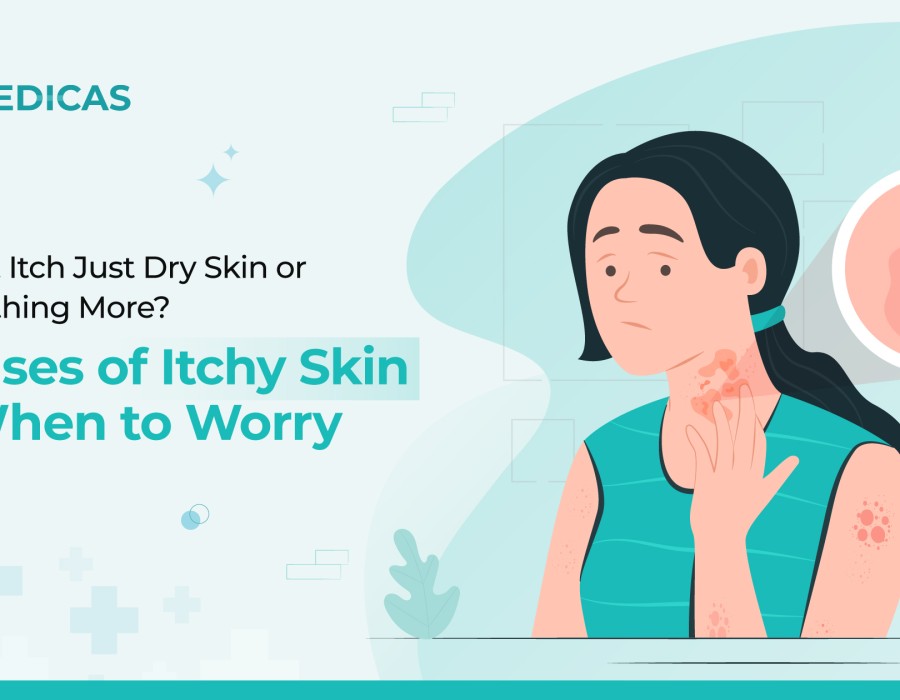Itchy Skin Causes: Common Triggers and When to Seek Help
Itchy skin, or pruritus, is more than just a temporary annoyance—it’s a symptom that can stem from a wide variety of causes, ranging from environmental factors to serious internal health conditions. In India’s diverse climate and lifestyle setting, understanding the specific triggers and knowing when to consult a doctor can make all the difference in achieving relief.
What Causes Itchy Skin?
Itching can result from something as simple as dry air or as complex as an underlying disease. Here are the most common triggers:
1. Dry Skin (Xerosis)
One of the most frequent causes, especially during winter or in heavily air-conditioned spaces.
- Common symptoms: Flaky or tight skin, especially on arms, legs, or hands.
- Indian context: Hard water and frequent soap use worsen the issue.
2. Allergies
Your skin may react to allergens in foods, fabrics, or cosmetics.
- Common culprits: Dairy, nuts, shellfish, synthetic clothing, harsh detergents.
- Symptoms: Redness, itching, rashes, and in some cases, swelling or hives.
3. Eczema and Psoriasis
Both are chronic skin conditions that lead to inflammation and intense itching.
- Eczema is often triggered by allergens or stress.
- Psoriasis results in thick, scaly plaques and may be genetic or stress-induced.
4. Insect Bites and Environmental Irritants
Mosquito bites, bed bugs, or exposure to pollution and chemicals can cause localized itching and irritation.
- People in urban India often deal with increased exposure to environmental triggers.
5. Fungal Infections
Warm, humid climates (like during Indian monsoons) promote fungal skin infections.
- Common forms: Ringworm, candidiasis.
- Typically affect feet, groin, or skin folds.
6. Internal Medical Conditions
Itching without a rash may indicate a deeper health issue such as:
- Liver or kidney disease
- Thyroid imbalances
- Diabetes
- Iron deficiency or anemia
These conditions require lab tests and proper diagnosis.
7. Stress and Mental Health
Emotional stress can worsen or even trigger skin conditions like eczema and hives, making management more complex.
When Should You See a Doctor?
It’s time to consult a dermatologist or physician if you experience:
- Itching that lasts more than 2 weeks
- Severe itching disrupting sleep or daily life
- Accompanying symptoms like jaundice, fatigue, fever, or weight loss
- Spreading or oozing rashes
- Itching without any visible cause
Diagnosis and Treatment
A skin specialist may recommend:
- Blood tests to check for liver, kidney, or thyroid disorders
- Allergy testing (patch or prick tests)
- Skin scrapings for fungal or parasitic infections
Common Treatments Include:
- Topical creams: Steroids or anti-fungal creams
- Oral antihistamines: For allergy-related itching
- Moisturizers: Especially those with ceramides, urea, or glycerin
- Lifestyle changes: Stress reduction, skin-friendly detergents, and gentle skincare
Preventing Itchy Skin
- Keep your skin moisturized, especially after bathing
- Avoid known allergens and harsh skincare products
- Wear breathable, natural fabrics like cotton
- Maintain hydration and a balanced diet
- Manage stress through yoga, mindfulness, or exercise
Final Thoughts
Itchy skin may seem minor, but when persistent or severe, it can hint at larger health concerns. By understanding common triggers—from dry weather to systemic diseases—you can take proactive steps to find relief and protect your skin health.
If you're struggling with unexplained itching, don't wait. Seek help from a certified dermatologist—early intervention leads to faster relief and better outcomes.





Comments